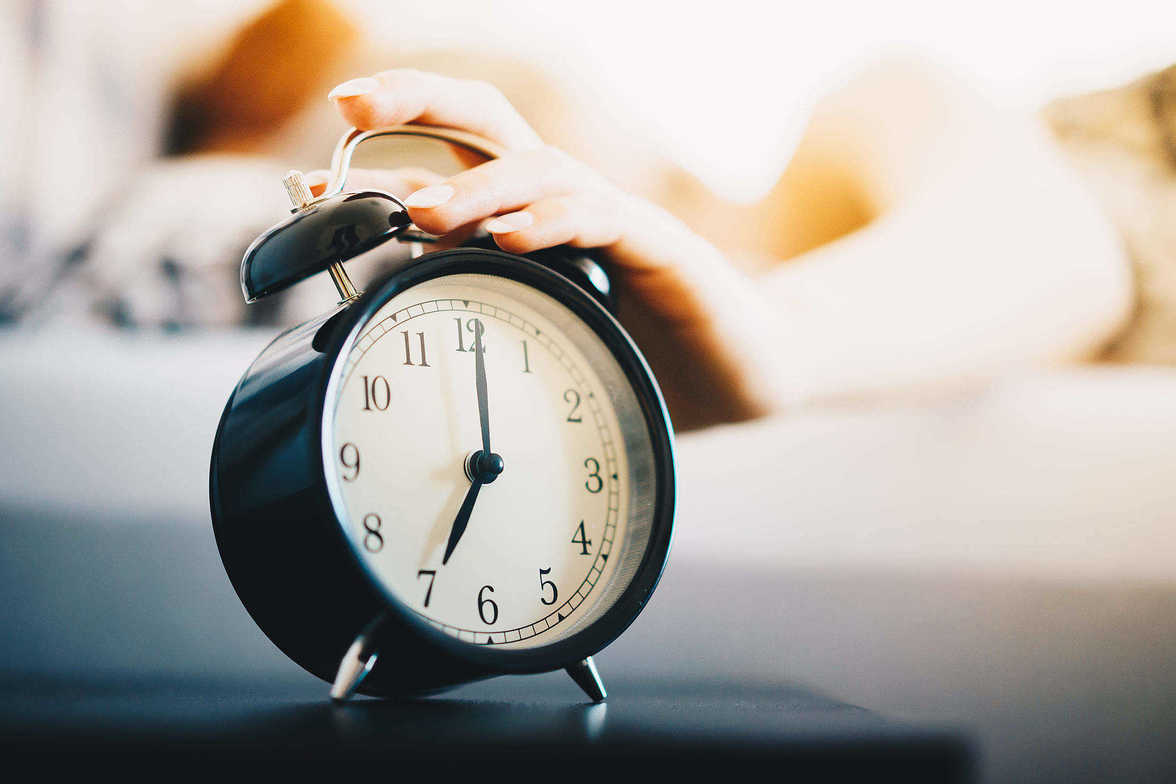
The Morning Routine has become the lynchpin of success for some of the world's most influential and talented humans, across every domain and discipline.
It offers a shortcut to mental clarity, provisioning you with a clear intention for the day, insulation from anxiety and worry, and a steadfast platform for your emotions. Carving time each morning to practice self-care will confirm for you a clear sense of purpose that makes every minute of your day feel faster, more fulfilling, and less hectic.
The most important part of this practice is when you cultivate it, it becomes a habit (usually within a few weeks), and you feel as if you never could have lived without it.
To be clear, when you establish a morning routine, you do so with the knowledge that you are automatically setting yourself up for nightly sleeping success. You set into motion a series of events that culminate in creating fertile sleeping conditions that will produce deeper, more healing sleep.
Waking Up - A Preface
Successful sleep depends on everything you do the morning of. The night is dependent on the day. Every choice, thought, and action serves as the guard rails for your mind. Will you coast safely into your bed after a day of mindfulness and inner calm, or will you weave violently around hairpin turns, crashing into bed after a day of reactivity and chaos? It all starts in the morning. You set the tone for the day (and that ensuing night) as soon as your eyes open. What follows is a string of choices you make. Will those choices bolster your upcoming night of rest? Or will they sabotage your peaceful slumber?
When The Alarm Sounds
Stop. Do not reach for your phone unless you are turning off the alarm. Everyone starts their day with anxiety provoking urges to check their e-mail, their Facebook or Instagram feeds, or the news. This hardwired condition is no mystery. Social Media and News services are designed to hijack our brain's reward system to incentivize action that results in a shot of dopamine each time we tap, click, or swipe.
Each new image or article you view that was different than the previous results in a change in context for your brain. The brain indulges in one story, and after a few seconds is thrown into another. Our brain craves this novelty, and your iPhone supplies an infinite amount. You cannot win this battle. We seek instant gratification through clearing all notifications, satisfying our fear of missing out. "What happened when I was asleep?". Nothing important enough to knock you out of a good morning routine - so put down the phone and wake up!
Next, Practice Gratitude
The reason we are unhappy is because we never appreciate what we have. Our brains are wired to always want more. The Grass is Always Greener. This is a recipe for failure. In a study published in 2010 by Kahneman and Deaton, emotional well-being rises with higher income but decelerates around $75,000 - roughly $90,000 by today's standards. Diminishing returns ensue shortly after.
As Morgan Housel, author of The Psychology of Money explains, you think you want money but what you really want is the freedom of independence and autonomy. The surprising reality is so many of us already poses control over our independence and autonomy. Sadly, our spending habits and lack of discipline betray us. These worries and fears around debt and abundance infiltrate our minds and distort our understanding of how much we already have.
Take the first few moments of the morning to reflect on everything positive in your life. Be thankful for it all (health, a warm shelter, comfy bed, clean water and food, transportation, clothing, a safe environment without war or conflict, friends and family). Say to yourself "Universe, thank you so much for providing me with X", or "I am so thankful for X". Gratitude snowballs. It builds on itself, subconsciously. It makes you happy.
Do Some Breathwork
Take a nice deep breath in. Exhale. Do this several times. Wake your lungs up. They've been taking shallow breaths all night, sustaining you and keeping you alive. Thank them by giving them more oxygen. You can impart a massive impact on your immune system and your psychology through breathwork. Wim Hoff, extreme cold weather endurance athlete and breather extraordinaire states:
"Breathing is an unconscious process, regulated by the autonomic nervous system. All the functions of the body, like moving your muscles, digesting food, and even thinking, need oxygen. The processes behind these body functions produce carbon dioxide as a waste product, and it’s the lungs that provide your body with oxygen, and that get rid of the carbon dioxide".
Start the day by infusing yourself with oxygen.
Begin
Have a favorite coffee? Steep it. Triggered by aromas? Burn some incense. Does music stir your soul? Turn on that smart speaker. Surround yourself with comfort and peace as the sun gently rises. The early hours of the morning are there for you to cultivate an inner peace that no one else will give you. This is your time to set the day's tone and convince your mind "this is how we will proceed, with slow and steady purpose, until we have met and overcome each of the day's challenges, for the greatest good of all".
Physical activity can also get the blood pumping and invigorate your groggy body. Push-ups and gentle Yoga poses are enough - try the Cat Camel, Child's Pose, Warrior Pose and body weight squats. Priming your motor system pays dividends as the day progresses.
Tim Ferriss, blogger, entrepreneur, and lifestyle premier takes his morning routines extremely seriously. He's implemented a few timeless strategies that have been echoed by monks, navy seals, and writers across the expanse of time to tame his monkey brain and preserve his daily stamina. Remarking of his own habits, Tim speaks to the power of making your bed as soon as you leave it:
"External mess creates internal mess".
Making your bed should be your first action after your feet hit the floor. What could be better than starting the day with a successful task completed?
Write in Your Journal
In Ryan Holiday's book "Stillness is The Key", he writes:
"Instead of carrying that baggage around in our heads or hearts, we put it down on paper. Instead of letting racing thoughts run unchecked or leaving half-baked assumptions unquestioned, we force ourselves to write and examine them. Putting your own thinking down on paper lets you see it from a distance. It gives you objectivity that is so often missing when anxiety and fears and frustrations flood your mind".
Sit down in a quiet place for 5 minutes and just write. No excuses. If you are new to journaling, Google "The 5 Minute Journal" to get started. If you are a journaling veteran, Google "Journal Speak" to dive deeper.
Do Meditation
People scare themselves away from meditation. Our society loves to reinforce this perceived tediousness surrounding meditation to the effect that folks just won't do it for fear of immediate failure. Meditation, as Tim Ferriss puts it, fosters:
"Less emotional reactivity".
What this means is from simply sitting, bringing your attention to your breath, allowing thoughts to come and go (and not chasing them) you give yourself the space to first feel, then think. When misfortune arises, knocking you from your proverbial horse, you respond with grace rather than react with irrational haphazardness. Sam Harris, philosopher and prolific writer on the topics of neuroscience and religion takes this a step further:
"Meditation isn't about understanding things conceptually, it's the ability to experience things more clearly, prior to concepts, and the more you practice it, you'll find that it really is a new form of intelligence that leads to another way of being in the world, and one that can allow for a kind of psychological freedom that a continuous entanglement with concepts doesn't".
Give yourself the opportunity to take advantage of what Sir John Hargrave describes as The Attention Economy:
"Imagine that tomorrow you wake up in a parallel universe. Everything in this universe is the same except for one big difference: money has been replaced by attention. All citizens have little meters attached to their heads, right between their eyes, that show where they've been sending their limited daily supply of attention".
Protect your attention. Do this by meditating.
Hydrate
Fill a glass with water and squeeze some fresh lemon. This hydrates you and replenishes the moisture you lost from a night of breathing. Moisture is lost from the breath and if we sweat during the night, we wake up in a state of relative dehydration.
The more hydrated you are, the larger your brain becomes. Brain tissue swells (in a good way) with increased hydration. To illustrate these benefits further, a study was conducted by Zhang et al. titled "The effects of Dehydration and Rehydration on Cognitive Performance and Mood Among Male College Students in Cangzhou, China".
The study found that college students who were properly hydrated had improved reading speed, mental work ability, mood, short term memory, attention, and reaction. Furthermore, from the same study, "Water accounts for 75% of brain mass". So, drink up in the morning.
Everything described above can be cultivated into a short morning practice. You don't need to do everything listed but getting started with a few and building as you go can work wonders. Add and subtract until you find a morning routine that benefits you. Repeat daily and you will be setting yourself up for success.
And remember, information found here is only a beginning - please seek consultation with your medical & health care providers for proper evaluation, diagnosis and treatment!
Keep Searching,
Dr. Nick



